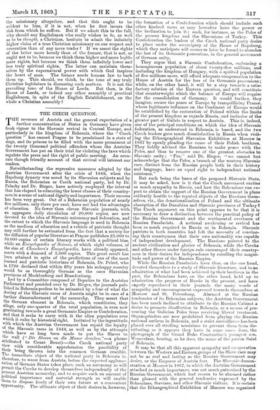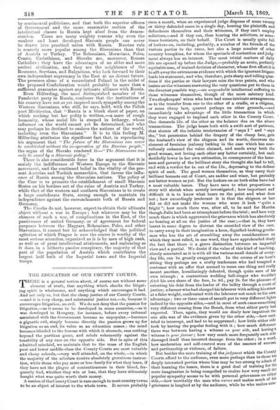THE CZECH QUESTION.
THE reverses of Austria and the general expectation of a further concentration of States in Germany have given fresh vigour to the Slavonic revival in Central Europe, and particularly in the kingdom of Bohemia, where the "Czech question " has caused Prague to be proclaimed in a state of siege, and its prisons to be filled with the more prominent of the twenty thousand political offenders whom the Austrian Government has put on their trial for violating the laws which regulate the press and the right of public meeting. An accurate though friendly account of that revival will interest our readers.
Notwithstanding the repressive measures adopted by the Austrian Government after the crisis of 1848, when the Hapsburg dynasty was saved by its Slavonian subjects and by Russia, the Bohemian or Czech national party, led by Dr. Palacky and Dr. Rieger, have actively employed the interval that has elapsed in educating the lower classes of their countrymen in a sense of national dignityand importance. Their success has been very great. Out of a Bohemian population of nearly five millions, only three per cent. have not had the advantages of education. No fewer than eleven Slavonic journals, with an aggregate daily circulation of 20,000 copies, are now devoted to the idea of Slavonic autonomy and federation, and the extent to which the Slavonic language is used in Bohemia as the medium of education and a vehicle of patriotic thought may still further be estimated from the fact that a society for the diffusion of popular literature at Prague publishes 25,000 to 30,000 copies of certain literary works with a political bias, while an Encyclopedia of Science, of which eight volumes, of the size of Chambers's Encyclopedia, have already appeared, meets with a demand of 5,000 copies. This great result has been attained in spite of the predictions of one of the most learned and patriotic historians of Bohemia, Dr. Pelzel, who in 1790 declared that within fifty years his unhappy country would be as thoroughly German as the once Slavonian provinces of Mecklenburg and Brandenburg.
Led by a Committee composed of Deputies to the Austrian Parliament and presided over by Dr. Rieger, the journals pubhshed in Bohemia profess to be animated by a fear of what the destiny of the Slavonic races of Austria might be in case of a further dismemberment of the monarchy. They assert that the German element in Bohemia, which constitutes, they allege, only one-quarter of the total population, is even now gravitating towards a great Germanic Empire or Confederation, and that it seeks to carry with it the alien population over which it rules by historical right. Irritated by the ingratitude
with which the Austrian Government has repaid the loyalty of the Slavonic races in 1848, as well as by the attempts Which have so long been made to put the Slaves to the wall ("Die Slaven an die Mauer dracken,"—a phrase attributed to Count Beust)—the Czech national party view with considerable apprehension the possibility of their . being thrown into the common German crucible. The immediate object of the national party in Bohemia is, therefore, to wrest from Austria, before the expected agglomeration of German States takes place, such an autonomy as will permit the Czechs to develop themselves independently of the present Austrian monarchy, and to acquire such an amount of Political importance and material strength as will enable them to dispose freely of their own future at a convenient oPportunity. The ultimate object of their desires is, however,
the formation of a Confederation which should include such other kindred races as may hereafter have the power or the inclination to join it ; such, for instance, as the Poles of the present kingdom and the Slavonians of Turkey. This Confederation the leaders of the Czech national party desire to place under the sovereignty of the House of Hapsburg, which they anticipate will sooner or later be forced to abandon the last of its Germanic possessions, in the general movement of German unity.
They argue that a Slavonic Confederation, embracing a homogeneous population of about twenty-five millions, and including the kingdom of Hungary, with a spirited population of five millions more, will afford adequate compensation to the House of Austria for the loss of its Germanic possessions; while, on the other hand, it will be a step towards a satisfactory solution of the Eastern question, and will constitute that counterweight which the balance of Europe will require for the consolidation of Germany. It would further, they imagine, secure the peace of Europe by tranquilizing France, whose legitimate influence on the Continent of Europe would be established by the restoration of Poland within the limits of the present kingdom as regards Russia, and inclusive of the greater part of Galicia in respect to Austria. This is, indeed, one of the principal conditions on which the idea of Slavonic federation, as understood in Bohemia, is based, and the two Czech leaders gave much dissatisfaction in Russia when visiting the Ethnographical Slavonian Exhibition at Moscow in 1867 by openly pleading the cause of their Polish brethren. They boldly advised the Russians to make peace with the Poles, and thus to remove one of the greatest obstacles to Slavonic unity ; "For," said Dr. Rieger, "we cannot but acknowledge that the Poles, a branch of the western Slavonia race, distinct from the Russian people both in their history and language, have an equal right to independent national existence."
But such being the bases of the proposed Slavonic State, it may be asked, how is it that the Czech movement excites so much sympathy in Russia, and how the Bohemians can expect to obtain the support of the Russian Government in plans evidently hostile to the reputed objects of the Russians themselves, viz., the denationalization of Poland and the ultimate absorption of the Danubian and Slavonic provinces of Turkey? The Czech argument on this point appears to be that it is necessary to draw a distinction between the practical policy of the Russian Government and the sentimental overtures of Russian Panslavists. A national awakening or revival has been as much required in Russia as in Bohemia. Slavonic patriots in both countries had felt the necessity of convincing their countrymen that their own nationality was capable of independent development. The Russians pointed to the ancient civilization and glories of Bohemia, while the Czechs and other Slaves under foreign rule encouraged their countrymen in their desires for independence by extolling the magnitude and power of the Russian Empire.
While the Russian Panelavists have thus, on the one hand, devoted themselves io a study of Slavonic literature, and to an
admiration of what had been achieved by their brethren in the past, the Bohemians have, on the other hand, held up to admiration the progress of Russia in the present, and have eagerly reproduced in their journals the many words of sympathy and encouragement expressed towards themselves at Moscow and St. Petersburg. Alarmed at the Russian tendencies of its Bohemian subjects, the Austrian Government
has been much inclined to attribute to the Russian Cabinet a desire to promote disaffection in Bohemia, as a means of pre
venting the Galician Poles from receiving liberal treatment.
Organ-grinders are now prohibited from playing the Russian national anthem in Bohemia, and a strict surveillance has been
placed over all strolling musicians to prevent them from distributing, as it appears they have in some cases done, the photograph of the Grand Duke Constantine's youngest son, Wenceslaus, bearing, as he does, the name of the patron Saint of Bohemia.
It may be that all this apparent sympathy and co-operation between the Western and Eastern groups of the Slave race may not be as real and lasting as the Russian Government may
desire, or the Emperor of Austria fear. The Slavonic demonstration at Moscow in 1867, to which the Austrian Government attached so much importance, was not much patronized by the Russian Government, which had reason to be alarmed rather than pleased with the general tendencies expressed by the Bohemians, Servians, and other Slavonic visitors. It is certain that the Ethnographical Exhibition of Moscow was organized by sentimental politicians, and that both the superior officers of Government and the more reasonable section of the intellectual classes in Russia kept aloof from the demonstration. There are many weighty reasons why even the weakest. and least developed Slavonic people can never be drawn into practical union with Russia. Russian rule is scarcely more popular among the Slavonians than that of Austria or Turkey. The Bohemians, Moravians, Poles, 'Croats, Carinthians, and Slovaks are, moreover, Roman Catholics ; they have the advantages of an older and more perfect civilization, and they are the neighbours of the Roumans, Servians, and Bulgarians, who look forward to their own independent supremacy in the East at no distant future. The presence alone of a resuscitated Poland in the midst of the proposed Confederation would probably be more than a sufficient guarantee against any intimate alliance with Russia.
Even Hilferding, the most distinguished member of the Panslavist party in Russia, confesses that the institutions of his country have not as yet inspired much sympathy among the Western Slavonians, who still, he says, hold, with the Polish poet Mickiewicz, that "Russia is a blank sheet of paper, on which nothing but her polity is written,—a mass of rough humanity, whose social life is steeped in lethargy, whose influence on the world cannot yet be determined, and who may perhaps be destined to enslave the nations of the world, including even the Slavonians." It is to this feeling M. Hilferding attributes the significant fact that, in reproducing his argument that "The future of the Slavonians can never be established without the co-operation of the Russian people," the organ of the Slovaks rendered it—" The Slavonians can only be saved by a Slavonic policy."
There is also considerable force in the argument that it is mainly the indifference of Western Europe to the Slavonic ;novement, and the continued belief in the vitality of the present Austrian and Turkish monarchies, that favour the influence of Russia among the Slavonian nations. The policy of -the Czar is to promote the establishment of small Slavonic States on his borders out of the ruins of Austria and Turkey, while that of the western and southern Slavonians is to create a large confederate State, strong enough to maintain its independence against the encroachments both of Russia and Germany.
The Czechs do not, however, expect to obtain their ultimate object without a war in Europe ; but whatever may be the chances of such a war, of complications in the East, of the passiveness of united Germany, or of agreement for federal purposes between the Magyars, Bohemians, Poles, and other Slavonians, it cannot but be acknowledged that the political • agitation of which Prague is now the centre is worthy of the most serious attention, organized as it is by men of high rank, as well as of great intellectual attainments, and embracing as it does, in a hitherto passive conspiracy, the majority of that part of the population of Austria which contributes the largest half both of the Imperial taxes and the Imperial troops.



































 Previous page
Previous page